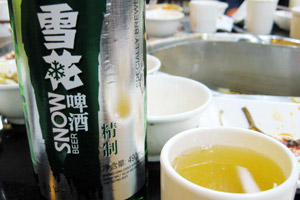China Resources Co chief calls accusations 'slander'
By ZHANG YAN and XU WEI (China Daily) Updated: 2014-04-17 02:34The chairman of State-owned conglomerate China Resources Co has called a Beijing reporter's claim that he is guilty of corruption "totally fabricated and malicious slander".
"His behavior has brought great harm to me and my family, as well as the reputation of my company," Song Lin said in a personal statement on the company's website.
 |
Wang Wenzhi, a reporter from Economic Information Daily under Xinhua News Agency , said on his micro blog on Wednesday that he had reported Song's alleged crimes to the nation's top anti-graft authority on Tuesday night.
Wang claimed that Song had an extramarital affair, violating social morality and Party discipline.
"Song used his job to arrange for her to work in the Hong Kong and Shanghai branches under United Bank of Switzerland, and she allegedly became an important channel for his accepting bribes and conducting money laundering," he said in the report.
UBS launched an investigation into the woman on Wednesday over the allegation that she obtained employment via improper means, according to the micro blog of the South China Morning Post in Hong Kong.
The top anti-graft agency has not yet responded to the accusations.
This is not the first time that Song has faced accusations of wrongdoing from micro-bloggers.
Those accusations were published online last year by Wang and another blogger.
Li Jianjun, a former journalist for the Shanxi Evening News and Chengdu Commercial Daily, was the first to publish allegations.
In June 2013, Li blogged that Song and top executives of a subsidiary company, China Resources Power, deliberately overpaid for coal mines purchased in Shanxi province in 2010, according to reports by Beijing Evening News and The Associated Press.
Neither China Resources nor Song responded to the accusations.
A month later, Song was the subject of online posts by Wang that pointed to alleged problems in the acquisition of a State-owned coal company, also in Shanxi.
China Resources responded quickly to the allegations, saying Wang's article was filled with "conjecture", "assumption" and "slander". It added that the company welcomed revelations of misconduct in its acquisitions and would hold those responsible for any illegal acts accountable.
Li, the first blogger, delivered his research materials to the Independent Commission Against Corruption in Hong Kong, since China Resources is a holding group registered and operating there, according to Beijing Evening News.
Song made a personal statement on Aug 7 on the China Resources website, calling the allegations false and claiming that the coal mine purchases in Shanxi were normal commercial transactions. All procedures were lawful, he said.
"Every Chinese resident has the right and is encouraged to expose corrupt officials' bribery and corrupt behavior, and real-name reporting is an effective way for anti-graft agencies to combat corruption," said Wu Mingan, a law professor at China University of Political Science and Law.
"But if an investigation finds the reports are fabricated, those who make the reports should face charges of defamation," he said.
Wu suggested that reporters should make their accusations known only through the top anti-graft agency's official network reporting platform rather than publishing them on their personal micro blogs.
Contact the writers at zhangyan1@chinadaily.com.cn and xuwei@chinadaily.com.cn
- More female officials caught in corruption
- Whampoa veterans recorded with glory
- Police bust 9 terrorist groups in Xinjiang
- Knife-wielding attackers seized in Xinjiang
- New regulation leads to drop in petitioned cases
- Hunan plant shut as probe into lead poisoning begins
- Police boost efforts to combat gambling
- Project offers jobs openings to legal experts
- Experts: Dog meat festival 'illegal'
- Nation looks to upgrade
pipeline networks






